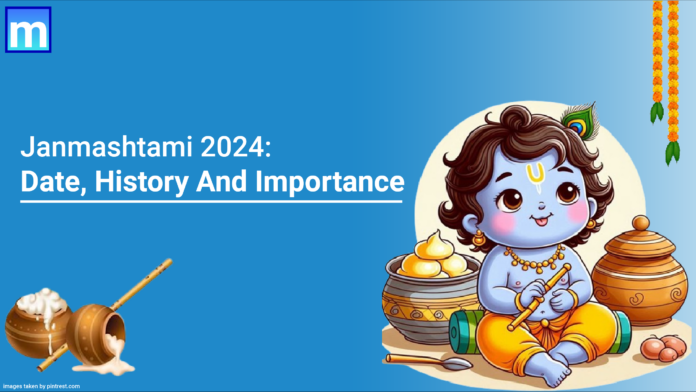Janmashtami is a prominent Hindu festival celebrating Lord Krishna’s birth, the eighth incarnation of Lord Vishnu. This festival is observed with great devotion and enthusiasm across India and holds substantial religious and cultural significance.
When is Janmashtami in 2024?
Janmashtami is a significant Hindu festival celebrated on the eighth day, known as Ashtami, of the dark fortnight, or Krishna Paksha, in the Hindu month of Shravan. This period usually corresponds to late August or early September in the Gregorian calendar. The exact date of Janmashtami can vary each year based on the lunar calendar, but it consistently falls on the eighth day of the dark lunar phase.
In 2024, Janmashtami will be observed on Monday, August 26th. This day is considered particularly auspicious for worshipping Lord Krishna, as it marks his divine birth. The festival involves various customs and traditions, including fasting, prayers, and midnight celebrations, believed to be when Krishna was born. These activities are deeply rooted in the cultural and religious practices associated with the celebration. The festival’s timing is crucial for devotees, who align their spiritual observances with the lunar calendar to honour Lord Krishna’s birth in the most promising manner.
Why is Janmashtami Important?
Lord Krishna is highly esteemed as a symbol of divine love, wisdom, and courage. His profound teachings and life stories are extensively detailed in the Bhagavad Gita and other sacred Hindu texts. These teachings have inspired and guided countless devotees across centuries, offering valuable insights into life’s complexities and spiritual pursuits. Krishna’s role as a divine guide and protector is central to his worship, as he embodies the principles of righteous living and devotion.
Janmashtami, the festival celebrating Krishna’s birth, is a significant occasion for devotees to reflect on his teachings and seek his blessings. It provides a dedicated time for followers to engage in worship, prayers, and spiritual practices, aligning themselves with the values Krishna espoused. The festival serves as a reminder of his divine qualities and the lessons he imparted, encouraging individuals to incorporate these teachings into their lives. Through the observance of Janmashtami, devotees honour Krishna’s enduring legacy and renew their commitment to living a life of virtue and devotion.
How is Janmashtami Celebrated?
Celebrations for Janmashtami blend devotion with festivity and vary across regions but typically include the following elements:
- Fasting: Devotees observe a fast from sunrise to sunset, consuming only water and fruits. This fast is broken after midnight, which is believed to be the time of Lord Krishna’s birth.
- Puja and Prayers: Special prayers and rituals are conducted during the festival. Devotees gather to chant mantras and hymns, creating a spiritually charged environment.
- Midnight Celebrations: The most significant aspect of Janmashtami is the midnight celebration, marking the supposed time of Krishna’s birth. Devotees sing devotional songs (bhajans), dance, and participate in cultural activities.
- Dahi Handi: In Maharashtra and other regions, Janmashtami is celebrated with the Dahi Handi event. This involves teams of young people forming human pyramids to break clay pots filled with curd, which is considered Lord Krishna’s favourite food.
- Krishna Leela: The festival often features plays and dramas depicting the life and exploits of Lord Krishna. These performances provide both entertainment and spiritual insight.
The Legend of Krishna’s Birth
Hindu mythology narrates that Lord Krishna was born to Devaki and Vasudeva in Mathura. His birth was threatened by the malevolent King Kamsa, who was determined to kill all newborn boys, as it was prophesied that one of them would end his reign. To protect Krishna, Vasudeva secretly transported the infant across the Yamuna River to Gokul, where he was entrusted to his foster parents, Nanda and Yashoda.
In Gokul, Krishna was raised in a loving environment far from Mathura’s dangers. As he grew, Krishna performed numerous miracles and displayed extraordinary abilities, which endeared him to the people and established his divine nature. His childhood exploits and divine interventions were instrumental in countering the evil forces threatening his people. Ultimately, Krishna fulfilled his divine mission by defeating King Kamsa and restoring peace and justice. This victory was pivotal in his divine protector and saviour role, demonstrating his purpose and power in Hindu mythology.
Traditional Customs and Practices
Several customs are observed during Janmashtami:
- Dressing Up as Krishna and Radha: Children often dress up as Lord Krishna and Radha, participating in fancy dress competitions and other activities.
- Decorating Homes: Homes are decorated with vibrant lights, flowers, and rangoli patterns, creating a festive and joyful ambience.
- Feasting: After the midnight puja, the fast is broken with a special meal. This feast typically includes foods believed to be Krishna’s favourites, such as butter, milk, and sweets.
- Community Gatherings: Janmashtami is also a time for reuniting families and communities. People exchange gifts, share sweets, and enjoy each other’s company.
The Spiritual Significance of Janmashtami
Beyond the festive celebrations, Janmashtami holds profound spiritual meaning. Lord Krishna’s teachings, particularly those in the Bhagavad Gita, offer valuable guidance on various aspects of life, such as duty (dharma), action (karma), and liberation (moksha). By celebrating Janmashtami, devotees aim to connect with the divine and incorporate Krishna’s teachings into their lives.
Janmashtami is a vibrant and significant festival that marks the birth of Lord Krishna. It combines spiritual reflection with joyful celebrations. By understanding the festival’s history, traditions, and significance, participants can engage in the celebrations with more profound appreciation and enthusiasm. Whether through fasting, prayers, or community activities, Janmashtami provides a meaningful opportunity to connect with the divine and embrace the teachings of Lord Krishna.




